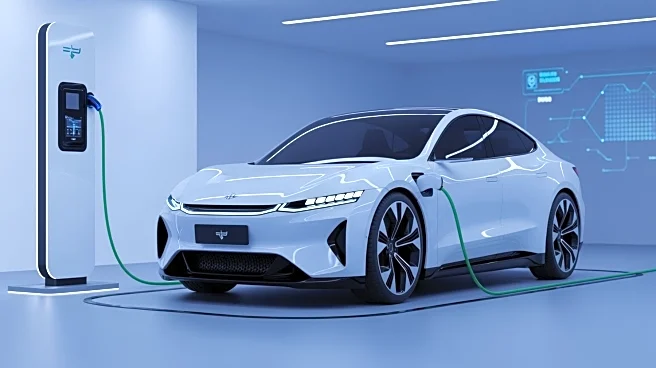What's Happening?
The UK Council for Automotive Academic Research (UKCAAR) has been launched to advance zero-emission mobility in the UK. This initiative, unveiled by the Advanced Propulsion Centre (APC), aims to unite
academia, industry, and government to identify strategic research priorities and anticipate disruptive technologies in sustainable transport. UKCAAR will strengthen connections between universities, manufacturers, and policymakers, supporting the UK's net-zero ambitions. The initiative includes the Feasibility Sprint, a competitive funding program for early-stage research projects in sustainable mobility, funded by the Department for Business and Trade (DBT) and delivered by the APC. The program encourages collaboration between universities and industry partners, focusing on zero-emission vehicle technologies, manufacturing competitiveness, and future vehicle innovation. A total of £330,000 is available, with grants ranging from £30,000 to £90,000 per project, requiring at least 50% in-kind match funding from an industry partner. Applications opened on October 20, 2025, and close on November 21, 2025, with projects expected to start on January 1, 2026, and conclude by July 31, 2026.
Why It's Important?
The launch of UKCAAR is significant for the UK's automotive sector as it seeks to position itself at the forefront of global zero-emission mobility solutions. By fostering collaboration between academia and industry, the initiative aims to accelerate the development of cutting-edge technologies that support the country's net-zero goals. This could enhance the UK's competitiveness in the automotive industry, attract investment, and create new job opportunities in sustainable transport. The focus on zero-emission vehicle technologies and manufacturing competitiveness aligns with the government's DRIVE35 strategy, which seeks to transform the UK's automotive landscape. Successful projects could lead to advancements in vehicle innovation, contributing to environmental sustainability and reducing the carbon footprint of the transport sector.
What's Next?
As UKCAAR begins its operations, stakeholders in academia and industry are expected to submit proposals for the Feasibility Sprint funding program. The collaboration between universities and industry partners will be crucial in advancing research projects that align with the UK's zero-emission goals. The APC and DBT will play a key role in supporting these projects, providing guidance and resources to ensure their success. The outcomes of these projects could influence future policy decisions and shape the direction of the UK's automotive industry. Additionally, the initiative may inspire similar collaborative efforts in other sectors, promoting innovation and sustainability across the UK.
Beyond the Headlines
The UKCAAR initiative highlights the growing importance of collaboration between academia, industry, and government in addressing complex challenges like climate change and sustainable transport. By leveraging the expertise of various stakeholders, the initiative aims to drive innovation and create a more sustainable future. This approach could serve as a model for other countries seeking to transition to zero-emission mobility, demonstrating the value of coordinated efforts in achieving environmental goals. Furthermore, the initiative underscores the role of research and development in shaping the future of industries, emphasizing the need for continued investment in innovation.








